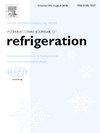Optimization of the regulation needle structure based on the flow regulation characteristic and flow loss mechanism
IF 3.5
2区 工程技术
Q1 ENGINEERING, MECHANICAL
International Journal of Refrigeration-revue Internationale Du Froid
Pub Date : 2024-10-11
DOI:10.1016/j.ijrefrig.2024.10.011
引用次数: 0
Abstract
The regulation needle is a key component of the variable ejector to guarantee the quality of flow control and improve ejector performance. However, the studies related to the variable ejector lack regulation needle structure optimization. In this paper, for both linear and arc-shaped nozzles, three different profiles of regulation needles: linear, elliptical, and parabolic types are optimized based on the flow regulation characteristic (FRC) and local flow loss mechanism. The calculation method of the variable nozzle FRC is established. The results show that for the arc-shaped nozzles when the bottom radius Rs of the regulation needle is 0.75 times throat radius Rt, a linear regulation needle with half-top angle αs being 32° is recommended, which makes the FRC ideal, minimizes the entropy production and maximizes the pressure recovery ratio (PRR). For the linear nozzles equipped with the elliptical regulation needle, as the ratio of the height to the bottom radius of the regulation needle head (RHR) increases, the FRCs get closer to the ideal parabolic type, however, the entropy production increases and the PRR decreases. Therefore, the RHR is advised to be 3 for linear nozzles. The findings can serve as important guidance for optimizing variable ejector design.
基于流量调节特性和流量损失机制的调节针结构优化
调节针是可变喷射器的关键部件,可保证流量控制质量,提高喷射器性能。然而,有关可变喷射器的研究缺乏对调节针结构的优化。本文根据流量调节特性(FRC)和局部流量损失机理,对线形和弧形喷嘴的三种不同形状的调节针:线形、椭圆形和抛物线形进行了优化。建立了可变喷嘴 FRC 的计算方法。结果表明,对于弧形喷嘴,当调节针的底部半径 Rs 是喉管半径 Rt 的 0.75 倍时,推荐使用半顶角 αs 为 32° 的线性调节针,这使得 FRC 理想,熵产生最小,压力恢复比(PRR)最大。对于配备椭圆形调节针的线性喷嘴,随着调节针头高度与底部半径(RHR)之比的增加,FRC 越来越接近理想的抛物线型,但熵产生增加,PRR 下降。因此,建议线性喷嘴的 RHR 为 3。这些发现可作为优化变量喷射器设计的重要指导。
本文章由计算机程序翻译,如有差异,请以英文原文为准。
求助全文
约1分钟内获得全文
求助全文
来源期刊
CiteScore
7.30
自引率
12.80%
发文量
363
审稿时长
3.7 months
期刊介绍:
The International Journal of Refrigeration is published for the International Institute of Refrigeration (IIR) by Elsevier. It is essential reading for all those wishing to keep abreast of research and industrial news in refrigeration, air conditioning and associated fields. This is particularly important in these times of rapid introduction of alternative refrigerants and the emergence of new technology. The journal has published special issues on alternative refrigerants and novel topics in the field of boiling, condensation, heat pumps, food refrigeration, carbon dioxide, ammonia, hydrocarbons, magnetic refrigeration at room temperature, sorptive cooling, phase change materials and slurries, ejector technology, compressors, and solar cooling.
As well as original research papers the International Journal of Refrigeration also includes review articles, papers presented at IIR conferences, short reports and letters describing preliminary results and experimental details, and letters to the Editor on recent areas of discussion and controversy. Other features include forthcoming events, conference reports and book reviews.
Papers are published in either English or French with the IIR news section in both languages.

 求助内容:
求助内容: 应助结果提醒方式:
应助结果提醒方式:


